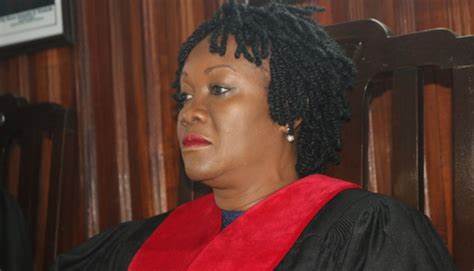In a recent address during the 2024 Convention of the Liberian National Bar Association in Nimba County, Chief Justice of the Supreme Court, Sie-A-Nyene G. Yuoh, issued a stern warning to magistrates across Liberia about the need to adhere to their jurisdictional limits. She emphasized the important role that magistrates play in the judiciary and highlighted her concern over cases of persistent non-support that linger for longer periods than legally permitted. The Chief Justice characterized such delays as a “travesty of justice” and underscored the Supreme Court’s commitment to ensuring timely resolution of cases. She stressed that magistrates are mandated to dispose of non-support cases within two days, emphasizing that the expectation for efficient case handling is essential to maintaining peace within their jurisdictions.
Chief Justice Yuoh invoked Rule 9 of the Rules and Regulations governing the operation of magisterial and circuit courts, which stipulates that civil cases should not be postponed for more than two weeks unless justified, and that criminal cases should generally be resolved within thirty days of an arrest. The Chief Justice clarified that the responsibility of magistrates is to expedite the legal process to allow for timely justice. Moreover, she pointed out their limited jurisdiction, which underscores the urgency of addressing cases without unnecessary delays. The importance of adhering to these rules was framed within the context of the legislative intent behind establishing magisterial courts, which is fundamentally to safeguard public peace.
Furthermore, the Chief Justice announced that the Supreme Court is initiating a strict compliance monitoring mechanism aimed at enforcing these time limits across all magisterial courts. She expressed particular concern regarding the common practice among some magistrates of granting continuances that stretch on for months, particularly in cases concerning non-support, which undermines justice. She called attention to examples where magistrates extended continuances for six months, allowing defendants to fetch necessary documents in summary proceedings aimed at recovering real property. This approach, she argued, not only delays justice but also raises questions about juristic rationality since any document brought forward by a defendant in such cases could eliminate the magistrate’s jurisdiction.
Justice Yuoh articulated that when a plaintiff seeks to recover possession of real property, the magistrates should issue judgments promptly. In cases where defendants reappear with their deeds, they hold the right to request a remedy from the circuit court, which has the appropriate jurisdiction. This delineation is crucial for understanding the scope of magisterial authority and the expectations set forth for magistrates. The Chief Justice’s summary of responsibilities aims to invigorate a sense of urgency in dealing with these cases, significantly so in a context where delays can aggravate already existing social and legal issues.
She further criticized the conduct of some lawyers who may engage in dilatory tactics, leveraging unnecessary legal technicalities to frustrate the judicial process. The Chief Justice characterized such actions as vexatious and unacceptable, presenting a need for the Supreme Court to take on a more active role in mitigating these obstacles to justice. Justice Yuoh’s commitment to overseeing a transparent, timely, and fearless adjudication of law highlights the judiciary’s role in upholding democratic principles and maintaining public trust in the legal system.
Ultimately, Chief Justice Yuoh’s address serves as both a directive and a clarion call for accountability and efficiency within Liberia’s judicial framework. Her remarks underscore the Supreme Court’s authority and readiness to impose appropriate penalties on magistrates who fail to comply with these essential timelines. With a collective responsibility to deliver justice expeditiously, magistrates and legal practitioners alike are reminded of their roles within the larger context of the justice system and the implications of their actions for societal harmony and fairness.














